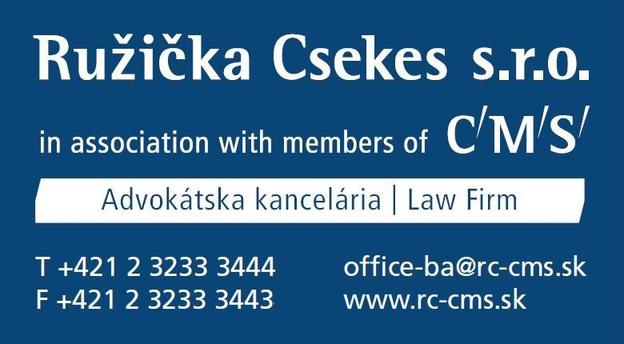In my practice, I am frequently confronted with the question whether an employee has the capability of devastating the firm or endanger its CEO, why this might happen and what are the consequences of such an event for the employer, employee, supervisors or for CEO.
To begin with, a laconic answer to the majority of the above questions would be "yes":
Employers and their CEOs may face a number of risks associated with illegal conduct of an employee. Indeed, this may be a result of the new law concerning criminal liability of legal entities (Criminal Liability Act No. 91/2016) that came into effect on 1 July 2016.
Why can this happen?
Supervision of an employee may not be sufficient. If such an employee commits a criminal offence, his/her employer, i.e. legal entity, may be held liable.
Hypothetically, this would involve an employee of a company committing a criminal offence listed in the new Criminal Liability Act (CL Act), and the crime will be "assigned" to the company. In other words, criminal proceedings may be conducted against the employer and the employer might by convicted and punished in a manner that was applicable solely to individuals in the past. Nonetheless, the employer would not be detained; rather, it would face e.g. the penalty of a ban on further business.
Who can be responsible?
Executive Officers and an employee whose responsibilities include also supervision over other employees (i.e. "compliance manager") are deemed 'qualified persons'.
I believe that cases where qualified persons will cause problems to their companies will not be rare. In the majority of cases, this will happen if an executive body or supervisor underestimates the supervision or control over employees.
Illegal conduct by employees may result in employers filing damage claims against its executive and representative bodies if it is proven that the executive body breached its obligation to carry out adequate and sufficient supervisory and control activities whereby it made the employee's illegal conduct or act possible.
What are the consequences?
According to the CL Act, a criminal offence committed by an employee may result, apart from punishment of the employee, employer, also rendering the responsible qualified person liable, and claiming damages against such a person.
If the person in question is an employee, the provisions of the Labour Code and/or Civil Code dealing with compensation for damages will be applied appropriately. Where a failure of the employer’s executive body, or member of the executive body (who is in many cases deemed employee, although his/her position is different from the legal aspect), employer may choose to follow the provision of the Commercial Code.
Damage claims against employees
Committing a criminal offence listed in the CL Act by employee may cause damages to the employer. Damage means a fine imposed on the employer or other damages associated with criminal activity.
Negligent and intentional criminal offences will be treated differently.
Having regard to the fact that majority of criminal offences pursuant to the CL Act are classified as intentional criminal offences, claims for compensation for damages caused by a conduct other than 'negligent act' will not be restricted solely to claiming amounts equalling "only" to four times the employee's average monthly salary. We would recommend to claim compensation for damages in cash, and to claim also potential lost profit. Damage may be caused also where employer is required to pay either a fine imposed in other type of proceedings, such administrative proceedings, or is required to compensate for costs of removal of a damage. Where final conviction has been handed down against the employee, then we are of the opinion that employer would not be required to provide evidence of the employee's guilt and may claim the entire damage against the employee.
In order to determine the employee who acted illegally, the employer should perform its internal investigation process. In doing so, employer would be able to lodge a claim for damages corresponding to four times the employee's average monthly salary as a result of negligent conduct, and possibly also a claim for damages pursuant to the Civil Code, should the employee's employment be terminated.
Employers are advised to introduce and strictly follow adequate and effective preventive measures.
How can companies "Get Rid" of employees?
An employer that is able to determine what exactly amounts to a breach of the working discipline and how such a breach is to be penalised will have an easier life and will always be in the right.
I believe that exact definition of acts (or failure to act) of an employer will deem a breach of working discipline from its own (commercial, manufacture, business) perspective – which have been duly notified to all employees together with potential consequences of such acts – will greatly improve the position of an employer who chooses to serve a termination notice or "fire" an employee on the spot. Nonetheless, only the court can decide, whether the termination of employment by notice or instantly is, or is not valid and effective.
Defence
Employers having in place compliance guidelines, i.e. internal policies dealing with supervision over compliance with legal regulations are already partly prepared for the defence. They only need to give certain consideration to the new piece of legislation and adjust and/or amend accordingly their internal policies.
From the CL Act perspective, it is necessary to prevent an employee from committing a criminal offence pursuant to the CL Act, expose his/her employer to criminal prosecution and to ensure – as part of the control and supervision procedures – compliance with all applicable legal and other regulations.
What may help in general – apart from the general application of the CL Act to legal entities, employers – is a functioning and efficient prevention, practical control mechanism and other measures legal entities already have in place for other reasons.
A number of foreign companies active in Slovakia have similar measures in place, such as measures against fraud, corruption, measures supporting whistleblowing, prevention of unfair conduct that are based – in addition to the Slovak law – also on the laws of the USA (FCPA) or United Kingdom (Anti-bribery Act).
Another set of efficient measures would include good quality drafting of employment contracts, working rules, codes of ethics, regular updates and amendments to existing internal policies and regular employee training, together with correct evaluation and assessment of the conduct by and acts of employees and subsequent application of consequences that would support the protection and defence of employers' interests.

Author:
Mgr. Sylvia Szabó,
Partner dealing with legal
aspect of corporate criminality issues
and compliance programs

 Mgr. Sylvia Szabó, Partner at Ružička Csekes s.r.o.
Mgr. Sylvia Szabó, Partner at Ružička Csekes s.r.o.